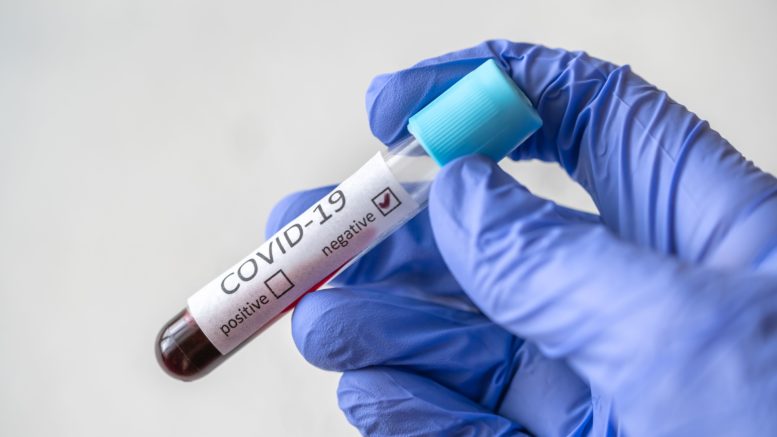Scientists at the Center for Infection and Immunity (CII) at Columbia University Mailman School of Public Health and SunYat-Sen University in China have set the stage for the development of highly sensitive antibody tests for infection with all known human coronaviruses, including new variants of SARS-CoV-2. These tests should also allow differentiation of immune responses due to infection and vaccination. The research is published in Communications Biology.
The HCoV-Peptide array developed by CII scientists consists of 3 million immune markers on a glass chip, covering proteins of all known human coronaviruses, including the SARS-CoV-2. In collaboration with a team at Sun Yat-Sen University, the CII researchers identified 29 immune signatures specific to SARS-CoV-2. These genetic fingerprints (peptides) provide the blueprint for tests that will be used for diagnostics and surveillance. Current antibody tests for SARS-CoV-2 infection may generate false positive results because of cross-reactivity with seasonal coronaviruses responsible for the common cold, as well as MERS-CoV and SARS-CoV-1.
To develop the HCoV-Peptide array, the researchers first analyzed blood samples taken from individuals with asymptomatic, mild, or severe SARS-CoV-2 infections, and controls including healthy individuals and those exposed to SARS-CoV-1 and seasonal coronaviruses. An analysis of all ~170,000 peptides related to known human coronaviruses yielded 29 peptides with the strongest and most specific reactivity with SARS-CoV-2. Next, they validated their test using a second set of blood samples, including those from confirmed cases of SARS-CoV-2, those with antibodies to other human coronaviruses, and healthy individuals.
The new test has a 98 percent specificity and sensitivity. Immune signatures were present from eight days after onset of COVID-19 symptoms to as long as six to seven months after infection.
"This work will allow us and others to build inexpensive, easy to use blood tests that can provide data for exposure as well as immunity," says author Nischay Mishra, PhD, assistant professor of epidemiology at the Columbia Mailman School.
"This work with our colleagues at SunYat-Sen, led by professor Jiahai Lu, and with Nimble Therapeutics, underscores the importance to public health of global collaboration and partnerships with industry in addressing the challenges of the COVID-19 pandemic," says senior and corresponding author W. Ian Lipkin, MD, director of CII.
Previously, the researchers have used similar methods to develop tests for Zika, acute flaccid myelitis, and tick-borne infections.
Co-authors also include Shreyas Joshi, Cheng Guo, James Ng, Riddhi Thakkar, Adrian Caciula, Rafal Tokarz, and Thomas Briese at CII; Xi Huang, Yongjian Wu, Xin Dong, Qianlin Li, and Jiahai Lu at Sun Yat-sen University, Guangzhou, China; and Richard Pinapati and Eric Sullivan at Nimble Therapeutics Inc, Madison, WI. Nischay Mishra, W. Ian Lipkin, Rafal Tokarz, Shreyas Joshi, Cheng Guo, and Thomas Briese are listed as the inventors on a patent filed that is related to findings in this study.
Research at Columbia was supported by the Chau Hoi Shuen Foundation and the Marin Community Foundation. Work at Sun Yat-Sen was funded by the Guangdong Scientific and Technological Research for COVID-19 (202020012612200001) and the National Science and Technology Major Project (No. 2018ZX10101002-001-001).
Source: Columbia University Mailman School of Public Health

Be the first to comment on "First Test for All Known Human Coronaviruses, Including New SARS-CoV-2 Variants"